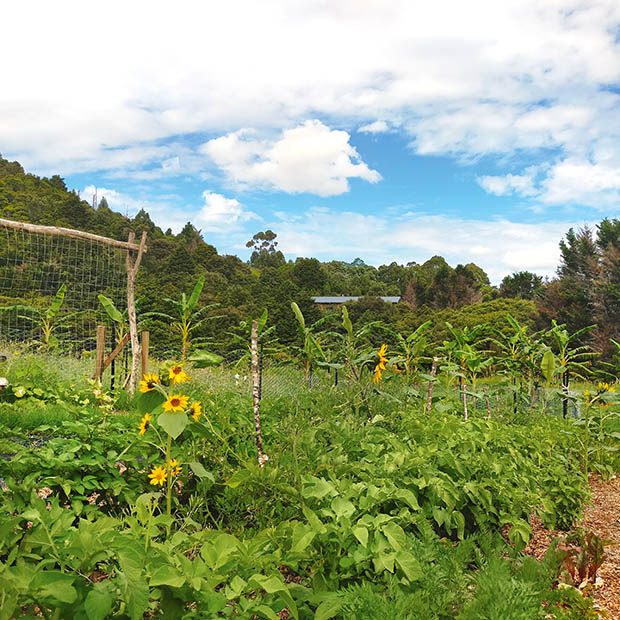Polly Greeks: An affliction of comparison

Polly turns to gratitude when infected with a dose of the “comparisons”.
Pre-dawn, when the world is porously saturated with night-time shadows, a secret space is available for insomniacs and early risers. Secreted in the cleft between night and day, a deep pool of emptiness exists. If your mind’s busy, the void can be easily missed, for this is a space that amplifies anxieties and mental chatter. But if you enter the silence with stillness, this, too, intensifies. In the quietness lies a potency. Actually, it’s always there; a responsive force underpinning our daily theatre of living — but for me, it’s most accessible in that quiet time when light is only just seeping into the eastern sky.
Entering this pocket of time, I practise a daily ritual of finding gratitude. I began it several years ago after catching a case of comparisons. When James and I first moved into our forest, the dead-end road seemed to run through a vast labyrinth of folded hillsides, delivering us into such a remote, secret valley the rest of the world faded to a distant echo. With time came a house, gardens, children, new friendships and roots bonding us to a community. We’ve chosen a lifestyle we love and unearthed great richness on the land. But as we reconnected to the outside world, old measures of wealth and success seeped like an incoming tide towards our sanctuary, eroding the fullness I’d found.
The affliction of comparison was caught from those speaking a language of “getting ahead” — its vocabulary filled with acquisitions, investments, upgrades, promotions and pay raises. Suddenly contrasting my life with various others, a focus on what was lacking became discontentedly predominant. If we’d stayed in the city, we could have built careers instead of a rustic, mudbrick home. With a bigger budget, our house would have more rooms. With more electricity, we’d have more appliances, equating to more ease. This was the nature of my infection.
“We can always leave,” said James, who is constantly open to the next great adventure. But here’s the thing: I don’t just love living in the wilderness; it’s become a part of me as vital as oxygen and blood. Knowing the surrounding forest extends over untold uninhabited ranges has expanded my soul in the same way moonless night skies reverberate with infinite starlight. The world I live in offers a connection to a sentient earth I’m still learning how to commune with. When considering selling our valley, regret and loss squeezed around my heart like clamps.
Gratitude proved to be the antidote. Abundance returns when you focus on all you have, instead of what’s absent. The pristine forest streams, the ever-changing song of the wind on the ridges, blossom morphing to fruit in the orchard, the ongoing emergence of children discovering their potential: this is a wealth that keeps growing. Contentment truly does come from appreciating what there is. Consumerism might pretend otherwise, but everyone knows the gratification of things doesn’t lead to enduring happiness. In the words of Sir Thomas Malory, “enough is a feast”.
The wonderful truth about practising gratitude is that you become ever richer through the process. Slipped within the stitching that fastens night to day, I’ve wondered if giving thanks in that potent space works like an echo, in that the appreciation I release meets the things I’m grateful for and reverberates back towards me, bringing me more of the same. Whatever we are emitting is what we’re tuned for and receptive to receiving.
In a way, practising gratitude is also the art of manifestation. Thanking life for great teachers, wonderful opportunities, loving friendships and an abundance of resources keeps them flowing to me in a way that’s both magical and affirms the responsive energy that underpins existence. Sometimes I’ve been given exactly what I’ve asked for, and it hasn’t proven right. Nowadays, I’ve discovered it’s better to focus on the feeling of fulfilment and see what swims to meet that sensation.
“We’re turning into peasants,” I said to James recently. After 12 years on the land, our ingredient list for happiness has never been simpler. We take this as a sign of success.
Love this story? Subscribe now!
 This article first appeared in NZ Life & Leisure Magazine.
This article first appeared in NZ Life & Leisure Magazine.
